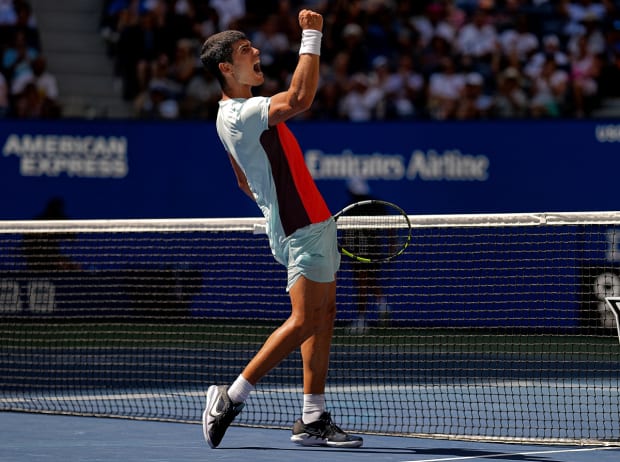Jon Wertheim spoke with the year’s breakout star about his drive to improve and his strategies for learning English.
It’s hard to pinpoint a seminal breakout moment for Carlos Alcaraz. There are so many to choose from. In May, the week he turned 19, he beat Rafa Nadal and Novak Djokovic on successive days and still had enough spark to smoke Alexander Zverev on the third day to win the prestigious Madrid event. A month before that, still 18, he won the 2022 Miami Open. A few months before that, at the ATP’s “Next Gen” year-end event, he made it clear he was the brightest tennis star in ascent, turning that week into a personal showcase, winning 15 of 16 sets against his young peers.
Before those wins, Alcaraz had already cleared his throat and announced himself to tennis fans in New York. At the 2021 U.S. Open, Alcaraz arrived ranked outside the top 50, known by the cognoscenti but not the casual fans in the seats and suites. In the first round, Alcaraz beat a seeded player, Cam Norrie, in a result that has aged well. In the third round, in Arthur Ashe Stadium, the biggest tennis venue in the word, Alcaraz took down the world’s No. 3 player at the time, Stefanos Tsitsipas. It wasn’t just that he won—it’s that he did so in a more than four hours into a grueling affair, 7-6 in the fifth set, after losing the fourth set 6-0.
Alcaraz is one of those athletes whose talent is easy to spot; and so is his winning constitution. For a player born the same season that Roger Federer first won a major, Alcaraz is possessed of a remarkably mature and complete game. Yes, there is industrial-grade power. But there is also speed and instinct and nuance. Here is a player built like a linebacker who uses the drop shot to devastating effect.
And as we move from intuition to data, terms like “It Factor” and “heart of a champion” almost seem anachronistic. But Alcaraz also has those immeasurable, intangible qualities presaging great success. Like his on-court idol, Rafa Nadal, Alcaraz plays with poise and body language that gives no hint as to whether he’s winning or losing. He engages the crowd. He balances happy-to-be-here perspective with I’m-am-here-to-win competitive resolve.
The winner of 75 of his first 100 matches as a pro (a preposterously hot start to a career), Alcaraz arrived at this year’s U.S. Open as a contender, a top four seed, and a player who would be featured in night matches. He’s lived up to the hype. He’s now the highest seed remaining in the draw, and tonight, in the quarterfinals, he’ll face Jannik Sinner. He’s the favorite to win the title now. Wearing his customary smile throughout, Alcaraz spoke with SI this summer. Like his tennis, his English is ever improving. Some outtakes, edited lightly for brevity and clarity:

Erick W. Rasco/Sports Illustrated
Jon Wertheim: What the best piece of advice someone gave you going into this year and what was that advice and who was it that said it?
Carlos Alcaraz: This year? I would say, my team, Juan Carlos [Ferrero], everyone in my in my team told me that I’ve won nothing. You know, I have to keep going and keep trying. Then even if I won a tournament, it would be 100, it has to be 1000. I've won nothing, you know. I would say that.
JW: What is it about tennis that makes you fall in love?
CA: The beautiful places, the beautiful courts that I saw when I was a kid, the beautiful matches. And yes. I loved tennis since the beginning. I mean my father brought me my first racket and the first time that I played tennis I fell in love, so I have not any specific moment to that, I watch that I fell in love with one. Just so many beautiful matches.
JW: How do you deal with the individual nature?
CA: How do you mean?
JW: Yeah, there are no teammates. There's no, there's nobody to share the blame with, if it's not a good day, there's no one you have to share the credit with, if it is a good day. How do you deal with the individual part of tennis?
CA: For me this is good. It's really good that tennis is an individual sport. I like to find ways to... by yourself, you know, solve problems. For me, I’m glad to be alone in the court and find solutions to problems.
JW: I feel like your English gets better every time you get interviewed. Where are you picking up your English?
CA: Well, in the interviews. When I travel. I'm watching some series and movies in English as well. Of course I'm trying to talk in English and with some teachers.
JW: What shows and movies are you watching?
CA: I’m watching more series than movies. Right now I'm watching Suits. You know, Suits?
JW: Meghan Markle?
CA: Yeah right. I like [a good] thriller series, too.
JW: What do you feel you've given up to be this good; what do you feel you have sacrificed to be this this good at one thing?
CA: Well, for me it's not a sacrifice at all. I love playing tennis. I love what I do right now. So there are of course sometimes that I uh, I want to be with my friends or stay at home with family and stuff. But for me I'm glad to travel a lot playing tennis, playing what I love on the, of course, for me it’s a privilege to live these moments, some beautiful moments in traveling around the world.
JW: What do you want people to know about you?
CA: I’m a friendly person, a nice person. I always try to wear a smile on my face. And I enjoy what I do.
More Tennis Coverage: